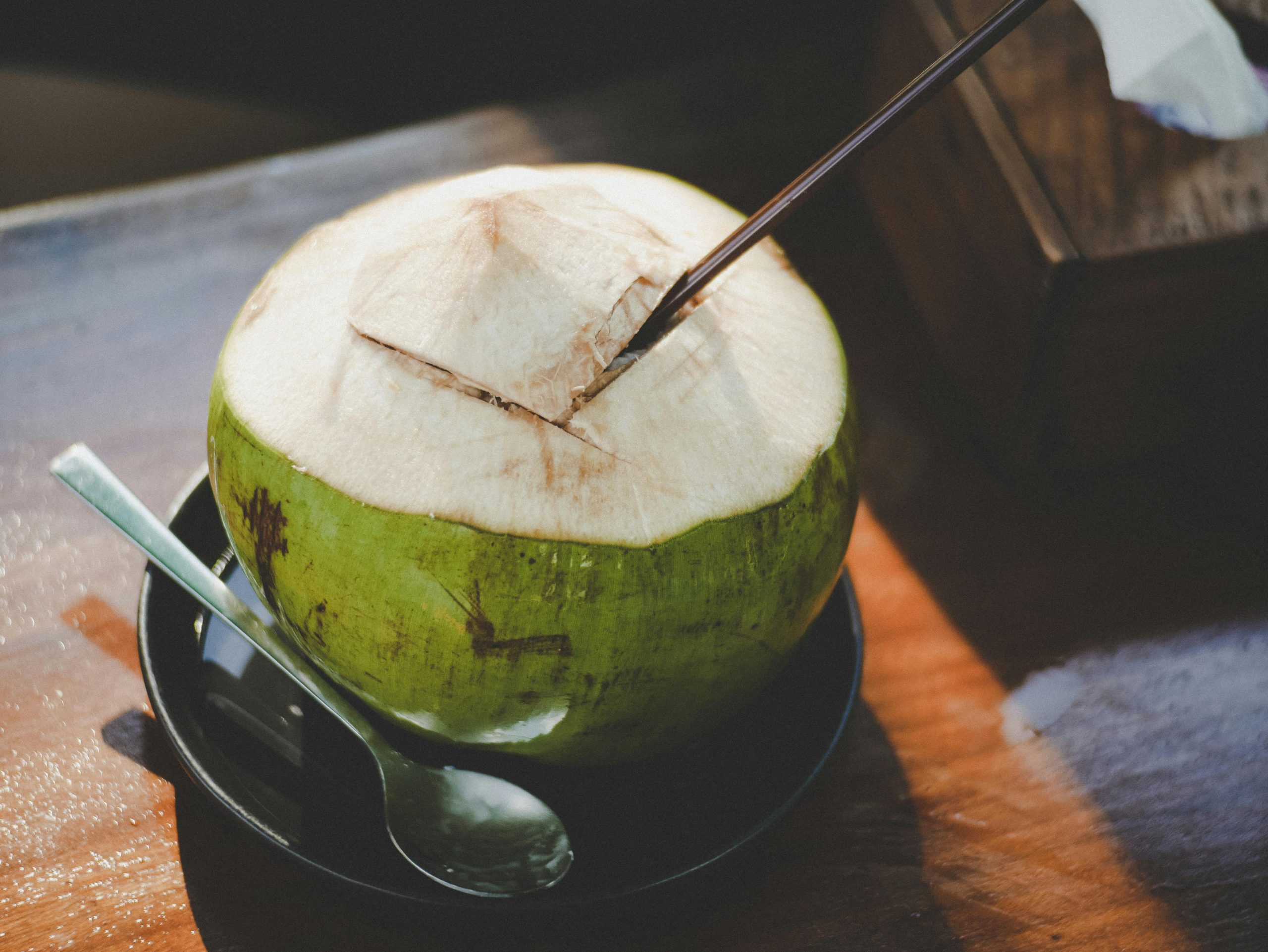
Coconut water has gained popularity as a refreshing and nutrient-packed beverage. Many people drink it for hydration, electrolyte balance, or simply for its light, tropical flavor. But beyond hydration, some claim coconut water can help with digestion and relieve constipation. So, does coconut water really make you poop? This article dives deep into the digestive benefits of coconut water, how it can support bowel movements, and tips for incorporating it safely into your diet.
1. Understanding Coconut Water
Coconut water is the clear liquid found inside young green coconuts. It differs from coconut milk, which is thicker, creamier, and higher in fats. One of the reasons coconut water is so popular is its natural balance of nutrients, which makes it a healthy beverage choice for almost anyone.
Key Nutrients in Coconut Water:
- Electrolytes: Potassium, magnesium, sodium, and calcium help regulate fluid balance and support muscle and nerve function.
- Vitamins: Contains vitamin C and B-complex vitamins, which assist in energy metabolism and immune function.
- Cytokinins: Plant-based compounds that may have anti-aging and anti-inflammatory effects.
Coconut water is low in calories and naturally hydrating, making it an excellent alternative to sugary beverages or sports drinks.
2. How Coconut Water Affects Digestion
Coconut water can have a gentle effect on digestion for some people. Its hydrating properties, along with essential minerals, can help keep your digestive system functioning properly. Staying hydrated is crucial for healthy bowel movements because water helps soften stool and prevents constipation.
Ways Coconut Water Supports Digestion:
- Hydration: Adequate water intake is essential for stool formation and smooth passage through the intestines.
- Potassium: Helps maintain fluid balance in the body, supporting the natural movement of the digestive tract.
- Magnesium: Plays a role in muscle function, including the smooth muscles of the intestines, which can improve peristalsis (the wave-like contractions that move food through the gut).
For those experiencing occasional constipation due to dehydration or a low-fiber diet, coconut water can provide gentle support for digestive regularity.
3. Natural Laxative Properties
Although not as strong as commercial laxatives, coconut water can act as a mild natural laxative. This effect is mainly due to its combination of water, electrolytes, and minimal fiber content. Drinking coconut water regularly may help stimulate bowel movements in a healthy and natural way.
Reasons Coconut Water May Make You Poop:
- High Water Content: Softens stool and makes it easier to pass.
- Electrolyte Balance: Potassium and magnesium can stimulate gut motility.
- Light Fiber Content: Soluble fiber helps add bulk and promotes smooth transit through the intestines.
It’s important to note that individual responses vary. While some people may notice a laxative effect within a few hours, others may not experience a noticeable change.
4. When Coconut Water Can Help Relieve Constipation
Constipation can result from many factors, including dehydration, low fiber intake, stress, or a sedentary lifestyle. One of the most common contributors is inadequate hydration, which can make stool dry and difficult to pass. Coconut water is naturally rich in electrolytes and fluids, making it an effective and gentle way to support bowel regularity, particularly in mild or occasional cases of constipation.
Situations Where Coconut Water May Be Helpful:
- After Travel or Fasting: Long periods without adequate fluid intake, such as during travel or fasting, can slow digestion. Coconut water replenishes lost fluids and helps rehydrate the digestive system.
- High-Protein or Low-Fiber Diets: Diets heavy in protein or low in fiber may lead to harder stools. Coconut water adds fluid and can help soften stool, making bowel movements easier.
- Occasional Digestive Sluggishness: Temporary digestive slowdowns caused by stress, changes in routine, or mild dehydration can benefit from the hydrating and mild stimulating effects of coconut water.
While coconut water can be a helpful remedy for occasional constipation, it’s important to note that chronic constipation may require more comprehensive dietary changes, including increasing fiber intake, incorporating regular physical activity, or consulting a healthcare professional for personalized advice. By pairing coconut water with a balanced diet and adequate hydration, you can support healthier, more regular bowel movements naturally.
5. How to Drink Coconut Water for Digestion
Incorporating coconut water into your routine is simple and convenient. To maximize its digestive benefits, it’s best to consume it fresh or from brands that do not add sugars or preservatives.
Tips for Optimal Use:
- Drink 1–2 cups (250–500 ml) per day, spread throughout the day.
- Consume before or after meals to aid digestion.
- Combine with high-fiber foods, like fruits, vegetables, or whole grains.
- Avoid mixing with sugary beverages to prevent excess calorie intake.
Moderation is key. Excessive consumption may lead to loose stools or mild digestive discomfort.
6. Other Health Benefits of Coconut Water
Coconut water is often praised for its gentle digestive effects, but its benefits extend far beyond relieving occasional constipation. This natural beverage is packed with essential nutrients, electrolytes, and antioxidants, making it a valuable addition to a healthy lifestyle. Its low-calorie content and hydrating properties also make it a smarter alternative to sugary drinks.
Other Advantages of Coconut Water:
- Hydration: Coconut water is rich in electrolytes such as potassium, magnesium, and sodium, which help replenish fluids lost during exercise, hot weather, or mild dehydration. Staying hydrated supports overall health, including kidney and muscle function.
- Heart Health: The potassium content in coconut water may help maintain healthy blood pressure levels and support cardiovascular function. Regular consumption in moderation can complement a heart-healthy diet.
- Antioxidants: Coconut water contains antioxidants that combat oxidative stress and inflammation in the body. These compounds help neutralize free radicals, potentially lowering the risk of chronic diseases.
- Weight Management: Naturally low in calories and sugar, coconut water can be a refreshing alternative to sodas and sweetened beverages. Its hydrating effect can also reduce cravings for high-calorie drinks.
- Digestive Support: Beyond its mild laxative effect, coconut water can aid digestion by promoting proper fluid balance in the gut, supporting nutrient absorption, and easing occasional bloating.
Incorporating coconut water into your daily routine can enhance overall wellness while providing hydration and essential nutrients. It works well on its own, mixed into smoothies, or even as a base for low-sugar beverages, making it versatile and convenient for maintaining a balanced, healthy diet.
7. Potential Side Effects and Precautions
Coconut water is widely considered safe for most people, but like any natural remedy or dietary addition, it should be consumed in moderation. Overconsumption or certain health conditions can make it less suitable for some individuals. Understanding potential side effects can help you enjoy its benefits safely.
Potential Side Effects:
- Digestive Upset: Drinking large amounts of coconut water can have a laxative effect, potentially causing loose stools or diarrhea. Start with moderate servings and observe how your body responds.
- High Potassium Levels: Coconut water is naturally high in potassium, which is usually beneficial. However, for individuals with kidney disease or those taking medications that affect potassium levels (such as certain blood pressure medicines), excessive intake can be risky. Monitoring potassium intake is important in these cases.
- Allergic Reactions: Though rare, some people may have allergic reactions to coconut water. Symptoms could include itching, rash, or gastrointestinal discomfort. Stop consumption and consult a healthcare professional if this occurs.
- Interactions with Medications: People taking diuretics or heart medications should exercise caution. Excessive potassium or fluid intake could interfere with medication effectiveness or electrolyte balance.
Precautions:
- Start with small amounts if you are new to coconut water and gradually increase intake.
- Individuals with chronic health conditions, particularly kidney disease, should consult a healthcare provider before adding coconut water to their routine.
- Maintain a balanced diet, using coconut water as a supplement to water and other nutrient-rich foods rather than a primary source of hydration.
By following these precautions and consuming coconut water in moderation, most people can safely enjoy its hydrating and health-promoting benefits without negative effects.
8. Coconut Water vs. Other Natural Laxatives
Coconut water is mild compared to stronger natural laxatives like prune juice, aloe vera juice, or fiber supplements. Each option has its advantages, depending on your needs and tolerance.
Comparisons:
- Prune Juice: Contains sorbitol, which provides a stronger laxative effect.
- Aloe Vera Juice: Can stimulate bowel movements but may cause cramps in some people.
- High-Fiber Smoothies: Add bulk and hydration for a more robust solution.
Coconut water is gentle and often better tolerated, especially for daily consumption or mild constipation relief.
9. Combining Coconut Water with a Healthy Lifestyle
Coconut water works best alongside healthy lifestyle habits that promote digestive health. Drinking it alone may not solve constipation caused by poor diet, lack of activity, or chronic issues.
Lifestyle Tips:
- Eat High-Fiber Foods: Vegetables, fruits, legumes, and whole grains.
- Stay Hydrated: Water and coconut water together provide better hydration.
- Exercise Regularly: Physical activity helps stimulate intestinal contractions.
- Limit Processed Foods: High-fat, low-fiber foods can worsen constipation.
This holistic approach enhances the benefits of coconut water for digestion and overall gut health.
10. Final Thoughts
In conclusion, coconut water can be a helpful addition to your diet for supporting healthy digestion and relieving occasional constipation. Its natural hydration, electrolytes, and mild fiber content work together to soften stool and promote regular bowel movements. When combined with a fiber-rich diet and an active lifestyle, coconut water may enhance overall gut health and digestive comfort. Individual responses can vary, with some people noticing effects more quickly than others. While it is a safe and natural option, coconut water should not replace medical treatment for chronic or severe digestive issues, and consulting a healthcare professional is recommended if constipation persists.


